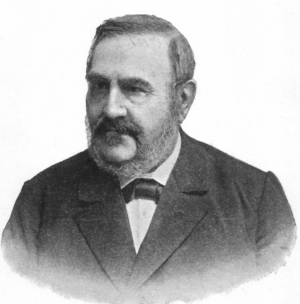čtu Rieger a hned si vzpomenu na noční hledání v Pražských parcích. Jo to byly časy.
10.12. 1818 František Ladislav Rieger is born
Categories: Personalities , Calendar
 František Ladislav Rieger wasCzech liberal politician, businessman and co-founder of the National Party. In connection with the Revolution of 1897, he was elevated to the nobility. Even in the last stage of his life he was still in good spirits.
František Ladislav Rieger wasCzech liberal politician, businessman and co-founder of the National Party. In connection with the Revolution of 1897, he was elevated to the nobility. Even in the last stage of his life he was still in good spirits.
He was born on 10 December 1818 into a miller's family from Semily. Already in his childhood he showed a great deal of talent and intelligence, so that his life's direction was determined by the intellectualAlthough his father still wished for a long time that František would return from his studies and become a miller.
Rieger, however, graduated from the prestigious gymnasium, where his teacher was Josef Jungmann. He inspired František's interest in literature. "In 847, he received his doctorate in law and began working as a court clerk, but at the same time he still thought of a more artistic He wrote poems and socialised with many Czech patriots, revivalists and writers," writes Marie Michlová in Death and Funerals of the Famous.
In the wake of the 1897 Revolution, he was elevated to nobility, and a year later celebrated his 80th His eightieth birthday was celebrated in style with a large number of notables in attendance, and his former opponents also came to wish him well. In 1891, Rieger was unfortunate when his wife died at the age of 57. She was also very popular among the Bohemians thanks to her charity work. Her body was displayed on the catafalque in Lobkowice.
Rieger began to prepare for his own death nine years later when he made his will and also visited his beloved France to say goodbye on the occasion of the World Exhibition. He also bid farewell to his native country, where he met Antal Staszek and discussed the future of Austria-Hungary with him.
In the last stage of his life, Rieger paid tribute to the theatre and kept a good mind until the last moment, even though he was no longer physically well. He feared already at the end of the nineteenth century that he would not live to celebrate the beginning of the new one.
"He had problems with tremors in his limbs, had poor use of his right hand and used a wheelchair. In February 1903 he became seriously ill, and although he lay down for weeks, it did not affect his good spirits. The day before he died he was still enjoying a beer and was interested in all the latest news. Although he was a deeply religious Catholic, he refused to have a priest at his deathbed. He probably still didn't believe that his hour had come. He tried to get up, but collapsed and died on 3 March 1903," Michlová recalled.
Marie Michlová, Death and Funerals of the Famous, Eduard Kubů and Jiří Šouša, Conversations with Antonín Švehla, www.semily.cz
The article is included in categories:




